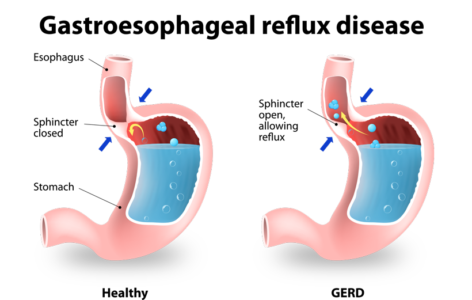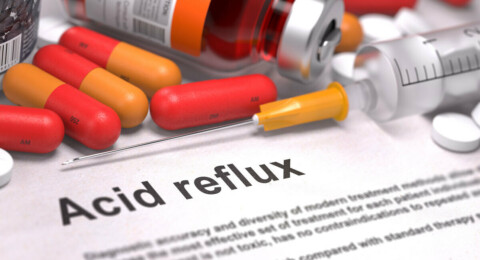What is Acid Reflux and GERD?
Acid reflux is a common condition that causes a burning pain, known as heartburn, in the lower chest area. Gastroesophageal reflux disease (GERD), also referred to as chronic acid reflux, is a condition where the stomach contents leak back (reflux) into the esophagus. This backward flow of acid irritates the lining of your esophagus causing frequent heartburn. If ignored, GERD can result in serious complications.
GERD Causes

Food travels from your mouth through your stomach through a tube called the esophagus. At the lower end of the esophagus is a ring-shaped muscle called the lower esophageal sphincter (LES). The LES functions as a one-way valve that allows food to pass to the stomach.
Normally, the LES closes immediately after swallowing to prevent stomach acids from backing up into the esophagus. In cases where the LES malfunctions, heartburn and esophageal damage may occur.
Some people are born with a naturally weak lower esophageal sphincter. Other causes of GERD are associated with lifestyle including diet, tight clothing, smoking, alcohol consumption, and vigorous exercise. Other things like certain medications can sometimes cause acid reflux and even a simple shift in your body position can cause it for some people. Many people with GERD also have a hiatal hernia contributing to the symptoms that would also need to be repaired.
Symptoms of Acid Reflux and GERD

Common symptoms of acid reflux and GERD can include:
- A burning sensation in your chest known as heartburn usually occurs after eating and can sometimes be worse at night
- Chest pain
- Difficulty swallowing
- The feeling of having a lump in your throat
- Regurgitation of food or sour liquid
People who suffer from acid reflux at night may also experience:
- Disrupted sleep
- Chronic cough
- Laryngitis
- Asthma that is new or worse than usual
Treatment Options for Acid Reflux and GERD
Non-Surgical Treatment Options for Chronic Acid Reflux
Lifestyle Modifications
Dietary changes may reduce the frequency and severity of heartburn symptoms. Losing weight, eliminating smoking and alcohol consumption, modifying eating habits, and changing sleeping patterns may also be effective options.
Medications for GERD
If lifestyle changes are unsuccessful, drug therapy may help. There are a few different options including an antacid regimen and proton pump inhibitors. An antacid regimen will neutralize stomach acids and relieve symptoms while a proton pump inhibitor will reduce the amount of acid in the stomach. There can be some side effects of using medications for long periods of time. If over-the-counter medications are not effective or only last for a short time, your doctor may prescribe a stronger drug or suggest a medical procedure to strengthen the lower esophageal sphincter.
Medical Procedures to Treat Acid Reflux and GERD
An outpatient procedure may be the best option for patients who don't see a change after making lifestyle changes and using medications or may not want to be on medication for the rest of their lives.
More About Acid Reflux & GERD

Is There a Link Between Obesity and Acid Reflux?

Asthma and Acid Reflux: Is There a Connection?

How Acid Reflux Can Affect Your Oral Health

What Triggers Acid Reflux and What Can You Do About It?

Is Your Upper Abdominal Pain Acid Reflux or a Gallbladder Attack?
